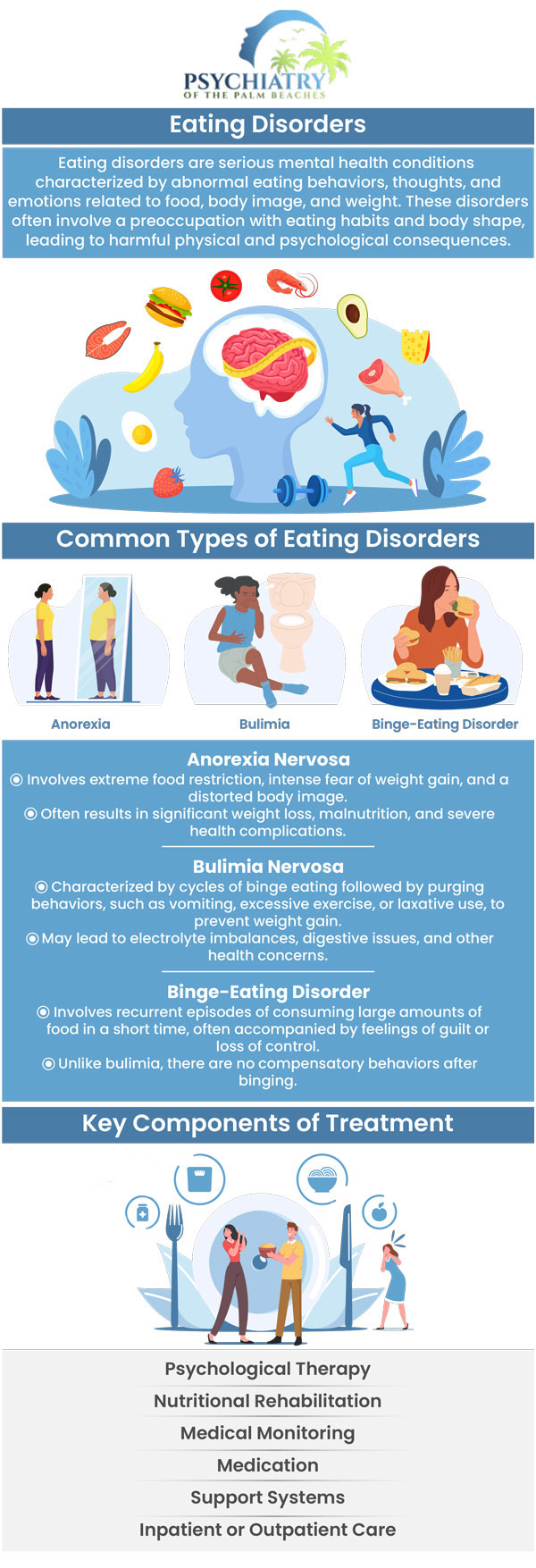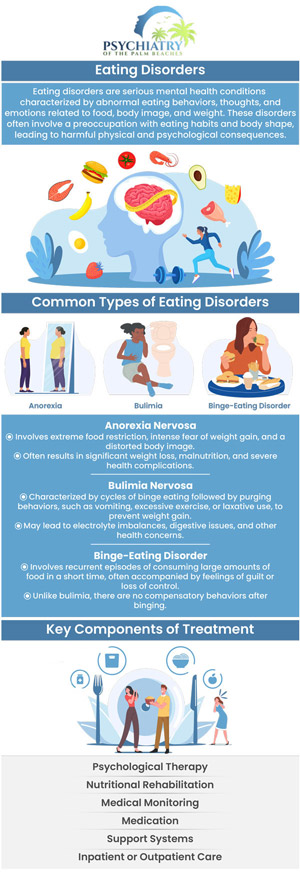Eating Disorders Treatment Q&A
Eating disorders are complex mental health conditions characterized by disturbances in eating behaviors, and often accompanied by intense emotions and distorted perceptions of body shape and weight. Some common eating disorders include anorexia nervosa, bulimia nervosa, binge eating disorder, and avoidant/ restrictive food intake disorder. Psychiatry of the Palm Beaches is here to help treat eating disorders. For more information, contact us or schedule an appointment online. We have convenient locations in Jacksonville FL, Boynton Beach FL, Palm Beach Gardens FL, Stuart FL, Royal Palm Beach FL, Port St. Lucie FL, Melbourne FL, and Fort Lauderdale FL.


Table of Contents:
What is an eating disorder?
How many eating disorders are there?
What causes eating disorders?
What are the symptoms of an eating disorder?
Where should I go if I think I have an eating disorder?
An eating disorder is a serious condition that can severely affect the person suffering from it, and in some cases, it can even be fatal.
Some people mistakenly think that an eating disorder is the consequence of a lifestyle choice that can be changed at any time, but in actuality, it is much more severe than that. An eating disorder can affect an individual’s psychological, physical, and social functioning and it is most often developed during adolescence and early adulthood. However, a person can develop an eating disorder at any stage of life.
The behavioral condition is characterized by constant and persistent worry about food, body weight, and shape and can affect men and women of all ages.
Some of the most widely known eating disorders include but are not limited to; bulimia nervosa, anorexia nervosa, binge-eating disorder, avoidant/restrictive food intake disorder (ARFID), and Pica.
Some of the most commonly known eating disorders to date are:
• Anorexia nervosa
• Bulimia nervosa
• Binge eating disorder
• Pica
• Rumination disorder
• Avoidant/restrictive food intake disorder (ARFID)
In addition to the six eating disorders mentioned above, some less commonly known eating disorders include.
• Purging disorder
• Night eating syndrome
Other specified feeding or eating disorders (OSFED) refer to conditions not found within the DSM-5. This term encompasses any other conditions that may have similar or interchangeable symptoms to those of a known eating disorder, but that do not meet all of the parameters of the conditions mentioned above.
Although the exact cause of eating disorders is currently unknown, it is believed by some health professionals that a combination of physical, social, genetic, and psychological factors may contribute to the development of an eating disorder.
Here is a list of some of the most understood and most commonly known causes.
• Personality
• Chemical imbalance
• Home environment
• Genetics
• Social pressures from the media
• Health problems
• A history of dieting
• Chronic dissatisfaction with your body image
• Seeing the disorder and its behavioral characteristics in a close relative
A variety of signs and symptoms characterize eating disorders, and although symptoms may vary with each disorder and amongst individuals, we have put together a list of the most common ones.
• Strange behavior around food
• Unusually low or high body weight
• An irregular diet; eating very little or overeating food.
• Eating alone or secretly
• Frequent bathroom use
• Obsessive thoughts about losing or gaining weight quickly
• Obsessive thoughts about physical appearance and body image
• Feeling guilty or ashamed about food and food consumption
If you or a loved one feels they might be suffering from an eating disorder, we encourage you to seek help at Psychiatry of the Palm Beaches.
There is hope, and you are not alone; treatments such as psychological therapy (psychotherapy), nutrition education, medication, and medical monitoring can help.
You can start by seeing a primary care practitioner, or if it is available to you, a mental health professional is also recommended. There are teams of professionals specializing in eating disorder treatment; you may need to ask your doctor for a referral.
• A treatment team for eating disorders may include:
• A psychiatrist or a psychologist depending on if you need medication or not.
• A registered dietitian will be able to provide nutritional education to help you.
• Medical or dental specialists: these professionals can address and treat health or dental problems that can result from your eating disorder.
• People you trust closest to you, such as your parents, partner, family, and friends.
Targeted Eating Disorder Treatment and Recovery With Our Team
At Psychiatry of the Palm Beaches, our team offers targeted therapy that addresses specific eating disorder symptoms and their emotional roots. Our care helps patients challenge negative thinking, build healthier habits, and restore a sense of self-control. This focused approach supports steady recovery and renewed confidence.
At Psychiatry of the Palm Beaches, we can help you identify and treat an eating disorder. We encourage you to contact us and book an appointment because we want to help you live your best life. We have convenient locations to serve you. We have convenient locations to serve you. We serve patients from Boynton Beach FL, Delray Beach FL, Palm Beach Gardens FL, Jupiter FL, Stuart FL, Palm City FL, Royal Palm Beach FL, Wellington FL, Citrus Ridge FL, Jacksonville FL, Riverside FL, Port St. Lucie FL, Beau Rivage West FL, Melbourne FL, Palm Bay FL, Fort Lauderdale FL, Hollywood FL, and surrounding areas.
Check Out Our 5 Star Reviews



Additional Services You May Need
▸ Mental Wellness
▸ Relationship Coaching
▸ Depression and Mood Disorders
▸ Women’s Health
▸ Panic Disorder
▸ Medications Management
▸ Men’s Health
▸ Individual Psychotherapy
▸ Bipolar
▸ ADHD
▸ Geriatric Mental Health
▸ Couple’s Counseling
▸ Obsessive Compulsive Disorder
▸ Social Phobia Treatment
▸ Eating Disorders
▸ Post Traumatic Stress Disorder
▸ Psychotic Disorders


